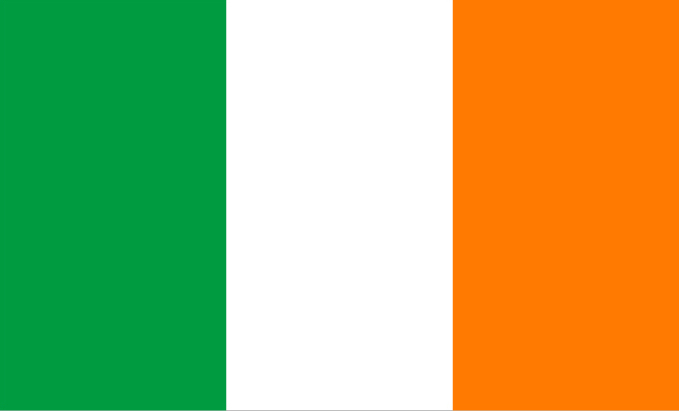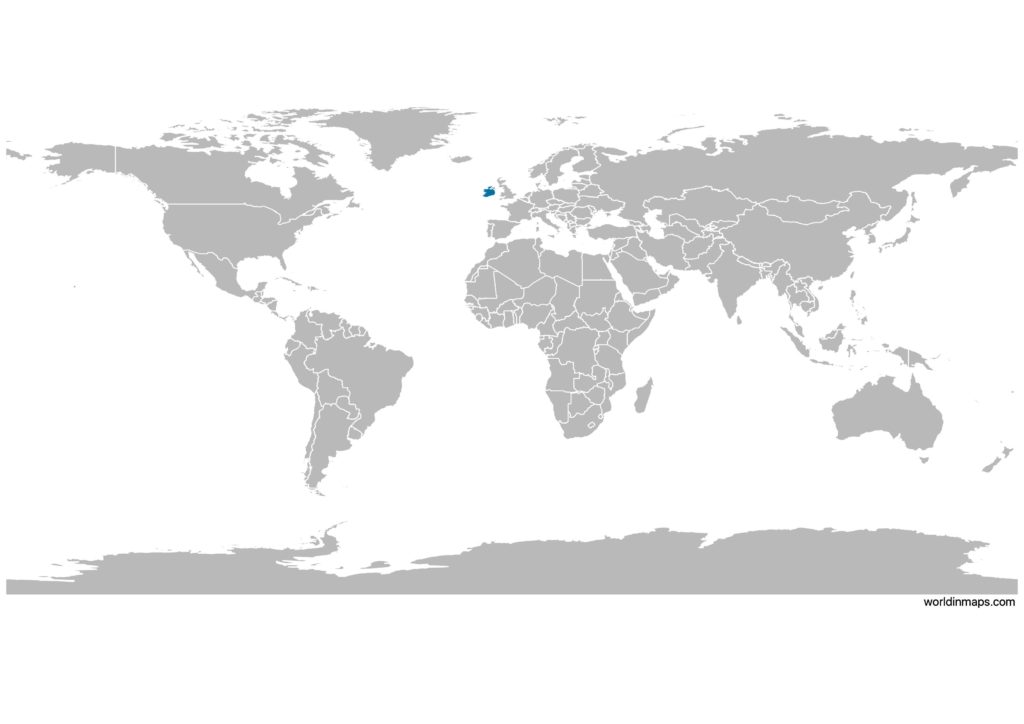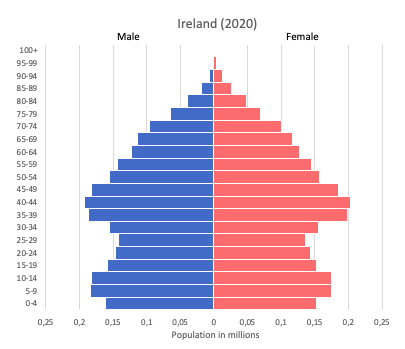Ireland

| Government | |
| Name | Ireland |
| Irish | Éire |
| Government type | Parliamentary republic |
| Capital | Dublin (1,173,179 (2016)) |
| Currency | Euro (EUR) |
| People | |
| Population (2020) | 4,937,796 (124th) |
| Density of population | 70 P/km2 (113th) |
| Nationality | Irish |
| Official languages | |
| English | |
| Irish | |
| Ethnic groups (2016) | |
| Irish | 82.2% |
| Irish travelers | 0.7% |
| Other white | 9.5% |
| Asian | 2.1% |
| Black | 1.4% |
| Other | 1.5% |
| Unspecified | 2.6% |
| Religions (2016) | |
| Roman Catholic | 78.3% |
| Church of Ireland | 2.7% |
| Other Christian | 1.6% |
| Orthodox | 1.3% |
| Muslim | 1.3% |
| Other | 2.4% |
| None | 9.8% |
| Unspecified | 2.6% |
| Life expectancy (2020) | |
| Male | 78.9 years |
| Female | 83.7 years |
| Total population | 81.2 years (36st) |
| Homicides | |
| Total (2018) | 0.9 per 100,000 people (148th) |
| Geography | |
| Land area | 68,883 km2 |
| water area | 1,390 km2 |
| total area | 70,273 km2 (121st) |
| Mean elevation | 118 m |
| Lowest point | |
| Atlantic Ocean | 0 m |
| Highest point | |
| Carrauntoohil | 1,041 m |
| Land use (2011) | |
| Agricultural land | 66.1% |
| Arable land | 15.4% |
| Permanent crops | 0% |
| Permanent pasture | 50.7% |
| Forest | 10.9% |
| Other | 23% |
| Urbanization | |
| Urban population (2020) | 63.7% |
| Rate of urbanization | 1.14% annual rate of change (2015 – 2020) |
| Economy | |
| Labor force (2017) | 2.226 million (122nd) |
| Labor force by occupation (2015) | |
| Agriculture | 5% |
| Industry | 11% |
| Services | 84% |
| Unemployment rate (2017) | 6.7% (100th) |
| GDP (PPP) (estimate 2019) | |
| Total | $412.797 billion (46th) |
| Per capita | $86,988(4th) |
| GDP (nominal) (estimate 2019) | |
| Total | $384.940 billion (32nd) |
| Per capita | $77,771 (4th) |
| GDP by sector (estimate 2017) | |
| Agriculture | 1.2% |
| Industry | 38.6% |
| Services | 60.2% |
| Exports (2017) | $219.7 billion (25th) |
| Exports partners (2017) | |
| US | 27.1% |
| UK | 13.4% |
| Belgium | 11% |
| Germany | 8.1% |
| Switzerland | 5.1% |
| Netherlands | 4.9% |
| France | 4.3% |
| Imports (2017) | $98.13 billion (34h) |
| Imports partners (2017) | |
| UK | 29% |
| US | 18.9% |
| France | 12.1% |
| Germany | 9.6% |
| Netherlands | 4.1% |
Ireland on the world map

Ireland top 10 largest cities (2016)
- Dublin (1,173,179)
- Cork (208,669)
- Limerick (94,192)
- Galway (79,934)
- Waterford (53,504)
- Drogheda (40,956)
- Swords (39,248)
- Dundalk (39,004)
- Bray (32,600)
- Navan (30,173)
Demography
Population pyramid

Age structure data
Estimate for 2020:
- 0-14 years: 21.15% (male 560,338/female 534,570)
- 15-24 years: 12.08% (male 316,239/female 308,872)
- 25-54 years: 42.19% (male 1,098,058/female 1,085,794)
- 55-64 years: 10.77% (male 278,836/female 278,498)
- 65 years and over: 13.82% (male 331,772/female 383,592)
Remark: the age structure of a population affects a nation’s key socioeconomic issues. Countries with young populations (high percentage under age 15) need to invest more in schools, while countries with older populations (high percentage ages 65 and over) need to invest more in the health sector. The age structure can also be used to help predict potential political issues. For example, the rapid growth of a young adult population unable to find employment can lead to unrest.
Population from 1950 to 2020
Source: United Nations, Department of Economic and Social Affairs, Population Division (2019). World Population Prospects 2019, Online Edition. Rev. 1.
Evolution of the life expectancy from 1960 to 2018
Source: World Development Indicators, The World Bank
Economy
Agriculture:
barley, potatoes, wheat, beef, dairy products
Industries:
pharmaceuticals, chemicals, computer hardware and software, food products, beverages and brewing, medical devices
Exports – commodities:
machinery and equipment, computers, chemicals, medical devices, pharmaceuticals, foodstuffs, animal products
Imports – commodities:
data processing equipment, other machinery and equipment, chemicals, petroleum and petroleum products, textiles, clothing
Time zone and current time in Ireland
Go to our interactive map to get the current time in Ireland